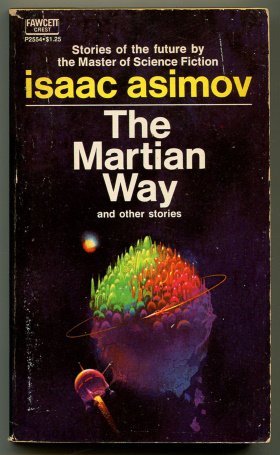But Chouns still looked about, arms akimbo, exasperated. Three of the tailed creatures had dogged him from hut to hut-patiently, never interfering, but remaining always between him and the geometrically cultivated pale pink blossoms. Now they stared multiply at him.
Smith said, ‘It’s the latest model, too. Look here.’ He pointed to the raised lettering which said Model X-20, Gamow Products, Warsaw, European Sector.
Chouns glanced at it and said impatiently, ‘What interests me is getting more. I know there are more Gamow sighters somewhere, I want them.’ His cheeks were flushed and his breathing heavy.
The sun was setting; the temperature dropped below the comfortable point. Smith sneezed twice, then Chouns.
‘We’ll catch pneumonia,’ snuffled Smith.
‘I’ve got to make them understand,’ said Chouns stubbornly. He had eaten hastily through a can of pork sausage, had gulped down a can of coffee, and was ready to try again.
He held the sighter high. ‘More,’ he said, ‘more,’ making encircling movements with his arms. He pointed to one sighter, then to the other, then to the imaginary additional ones lined up before him. ‘More.’
Then, as the last of the sun dipped below the horizon, a vast hum arose from all parts of the field as every creature in sight ducked its head, lifted its forked tail, and vibrated it into screaming invisibility in the twilight.
‘What in Space,’ muttered Smith uneasily. ‘Hey, look at the blooms!’ He sneezed again.
The pale pink flowers were shriveling visibly.
Chouns shouted to make himself heard above the hum, ‘It may be a reaction to sunset. You know, the blooms close at night. The noise may be a religious observance of the fact.’
A soft flick of a tail across his wrist attracted Chouns’s instant attention. The tail he had felt belonged to the nearest creature; and now it was raised to the sky, toward a bright object low on the western horizon. The tail bent downward to point to the sighter, then up again to the star.
Chouns said excitedly, ‘Of course-the inner planet; the other habitable one. These must have come from there.’ Then, reminded by the thought, he cried in sudden shock, ‘Hey, Smith, the hyperatomic motors are still out.’
Smith looked shocked, as though he had forgotten, too; then he mumbled, ‘Meant to tell you – they’re allright.’
‘You fixed them?’
‘Never touched them. ut when I was testing the sighters I used the hyperatomics and they worked. I didn’t pay any attention at the time; I forgot there was anything wrong. Anyway, they worked.’
‘Then let’s go,’ said Chouns at once. The thought of sleep never occurred to him.
Neither one slept through the six-hour trip. They remained at the controls in an almost drug-fed passion. Once again they chose a bare spot on which to land.
It was hot with an afternoon subtropical heat; and a broad, muddy river moved placidly by them. The near bank was of hardened mud riddled with large cavities.
The two men stepped out onto planetary surface and Smith cried hoarsely, ‘Chouns, look at that!’
Chouns shook off the other’s grasping hand. He said, ‘The same plants! I’ll be damned.’
There was no mistaking the pale pink blossoms, the stalk with its veined buds, and the coronet of spikes below. Again there was the geometric spacing, the careful planting and fertilization, the irrigation canals.
Smith said, ‘We haven’t made a mistake and circled—’
‘Oh, look at the sun; it’s twice the diameter it was before. And look there.’
Out of the nearest burrows in the river bank smoothly tan and sinuous objects, as limbless as snakes, emerged. They were a foot in diameter, ten feet in length. The two ends were equally featureless, equally blunt. Midway along their upper portions were bulges. All the bulges, as though on signal, grew before their eyes to fat ovals, split in two to form lipless, gaping mouths that opened and closed with a sound like a forest of dry sticks clapping together.
Then, just as on the outer planet, once their curiosities were satisfied and their fears calmed, most of the creatures drifted away toward the carefully cultivated field of plants.
Smith sneezed. The force of expelled breath against the sleeve of his jacket raised a powdering of dust.
He stared at that with amazement, then slapped himself and said, ‘Damn it, I’m dusty.’ The dust rose like a pale pink fog. ‘You, too,’ he added, slapping Chouns.
Both men sneezed with abandon.
‘Picked it up on the other planet, I suppose,’ said Chouns.
‘We can work up an allergy.’
‘Impossible.’ Chouns held up one of the sighters and shouted at the snake-things, ‘Do you have any of these?’
For a while there was nothing in answer but the splashing of water, as some of the snake things slid into the river and emerged with silvery clusters of water life, which they tucked beneath their bodies toward some hidden mouth.
But then one snake-thing, longer than the others, came thrusting along the ground, one blunt end raised questingly some two inches, weaving blindly side to side. The bulb in its center swelled gently at first, then alarmingly, splitting in two with an audible pop. There, nestling within the two halves, were two more sighters, the duplicates of the first two.
Chouns said ecstatically, ‘Lord in heaven, isn’t that beautiful?’
He stepped hastily forward, reaching out for the objects. The swelling that held them thinned and lengthened, forming what were almost tentacles. They reached out toward him.
Chouns was laughing. They were Gamow sighters all right; duplicates, absolute duplicates, of the first two. Chouns fondled them.
Smith was shouting, ‘Don’t you hear me? Chouns, damn it, listen to me.’
Chouns said, ‘What?’ He was dimly aware that Smith had been yelling at him for over a minute.
‘Look at the flowers, Chouns.’

























